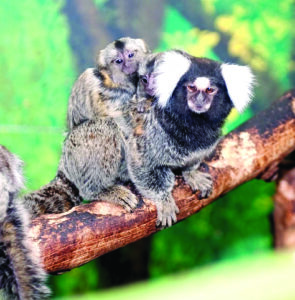By Dr. Beth Leermakers
Paternal involvement in child rearing varies by species. Some animal fathers are Mr. Mom. Others “help” with the kids, while the deadbeat dads take a hands-off approach to parenting — or abandon their offspring altogether.
In celebration of Father’s Day, test your knowledge about animal dads.
1. Which bird father cares for the eggs after the female lays them?
A. Emperor penguin
B. Flamingo
C. Ostrich
D. A and B
E. All of the above.
2. Which animal father keeps the eggs in a pouch and then cares for the young?
A. Kangaroo
B. Seahorse
C. Opossum
D. Sea otter

Photo courtesy of Five Sisters Zoo
3. Which primate father acts as a midwife and then feeds and carries the babies?
A. Marmoset
B. Baboon
C. Chimpanzee
D. Gibbon
4. When their mate is pregnant, what do the cotton-top tamarin dads do?
A. Play
B. Bring her food
C. Gain weight
D. Nothing
5. Which animal father does NOT share the child rearing responsibilities?
A. Lion
B. Tiger
C. Bear
D. All of the above.
6. What will Rhea dads do if a female bird approaches his nest?
A. Dance
B. Wink at her
C. Chase her away
D. Call to her
7. Which of these fish fathers carries eggs in his mouth for two months?
A. Rainbow trout
B. Koi
C. Bass
D. Catfish
Answers:
1. D. Emperor Penguin and Flamingo. The female Emperor Penguin passes her egg to the father, who keeps it in his insulated brood pouch for two months while the mother goes off to hunt. Dad doesn’t eat during that time. If the baby is born while mom is away, dad feeds it a special “milk” produced in his throat. Male and female flamingoes take turns incubating the egg. After the baby is born, dad shares the parenting duties equally with his mate. He even produces “milk” to feed his young.
2. B. Seahorse. Male seahorses get pregnant and carry eggs in their pouch until birth. Seahorses (monogamous fish) and sea dragons are the only species in which the males get pregnant and give birth.
3. A. Marmoset. Marmoset fathers play an active role during the delivery of their babies, cleaning up the afterbirth and biting off the umbilical cord. They care for their newborns, licking and grooming them while their mother recovers from labor. The father stays by his babies’ side, feeding them and carrying them on his back until they’re strong enough to travel independently.
4. C. Gain weight. Tamarin and Marmoset dads gain weight while their mate is pregnant. These primate fathers need to be ready to care for their babies, including carrying multiple babies weighing up to 20 percent of their adult body weight. Gaining weight may help the fathers meet the physical demands of child care.
5. D. All of the above. Lions do not take an active role in caring for their cubs. The female lions do all the hunting for their family, while the male defends his territory against intruders and predators.
Male tigers are also not involved in caring for their cubs. Mother tigers raise their 2-5 cubs on their own for 24-30 months, protecting them from predators and teaching them to hunt and defend themselves. After the male grizzly bear mates, he doesn’t have anything to do with raising his cubs. He leaves mama bear to care for them on her own for two to three years.
6. C. Chase her away. Rhea males mate with several females and build a single nest on the ground to hold all the eggs. Dad incubates the eggs for six weeks and fiercely defends the nest, chasing away male and female Rheas that approach.
7. D. Catfish. In some catfish species, the males are mouthbrooders — they keep their eggs in their mouths. Because it’s difficult to eat with their mouths full of eggs, catfish fathers don’t eat while the eggs are incubating. Male hardhead catfish keep fertilized eggs in their mouths for a whopping 80 days.
Coaching your child’s soccer team and helping with a science fair project seem like a breeze in comparison to going without food for several months.
Happy Father’s Day to the men who care for children of the 2-legged or 4-legged variety.
